Are you looking to build a website with WordPress? Choosing the right page builder is essential for your success. In 2025, Divi vs Elementor will be the two biggest contenders for best page builder. Both popular WordPress page builders offer powerful features and an intuitive user interface.
Elementor is a powerful page builder plugin that allows you to create stunning web pages in minutes. At the same time, Divi is both a theme and a theme builder that offers more flexibility and customization options. Elementor also has a free version of its plugin, which makes it attractive to users on a budget.
When deciding between Divi and Elementor, there are several factors to consider, such as their user interface, the types of features they offer, and their pricing. For example, Divi might be your best choice if you need a popup builder or an advanced theme-building capability.
So if you’re looking for an easier-to-use page builder with fewer features but still lots of power and flexibility, Elementor may be the way to go.
Ultimately, when it comes to choosing between Divi or Elementor in 2025, it depends on what your needs are and what type of features you’re looking for in a page builder plugin.
Both offer great options and can help you create stunning websites quickly and easily. But, ultimately, only you can decide which one is right for you!
Why Do You Need A Page Builder?
Page builders are essential for website design and development. They provide a great tool for building and customizing web pages with minimal effort. They allow users to quickly create attractive layouts and content without writing code. In addition, page builders make it easy to add content, images, videos, and other elements to a page to create an effective design.
They often include features such as drag-and-drop elements, pre-designed themes and templates, responsive design capabilities, and more.
With these features available at your fingertips, page builders can save time and energy while creating a website that looks professional and functions well. Ultimately, page builders are invaluable for website designers who want to bring their ideas to life quickly and efficiently.
Divi vs Elementor: Which One Should You Choose?
For all the readers who have the patience to sit and read the entire article, here is a quick comparison of Divi vs. Elementor covering all the primary aspects of both page builders.
| Parameters | Divi | Elementor |
| Rating | 4.8/5 | 4.9/5 |
| Pricing | Starts from $89 a year | Starts from $49 a year |
| Key features | Entire design control in all stages Excellent filters and code editing available eCommerce compatibility | Robust landing pages Actions links enabling easy interaction with the audience Thousands of widgets for systematic representation |
| Best for | Someone who wants the freedom to build entirely customized websites | People who are looking for a webpage builder which does not require coding skills |
Divi vs Elementor: Overview
Before we head to the detailed comparison, let us see a brief introduction on Divi vs. Elementor for those who have doubts and queries about the services the two platforms offer.
Divi Overview:
Divi is a WordPress theme that helps you build a website from scratch. Whether you are a freelancer, agency owner, or website owner Divi caters to everyone’severyone’s needs. Divi has hundreds of elements and styles that help quickly build your website.
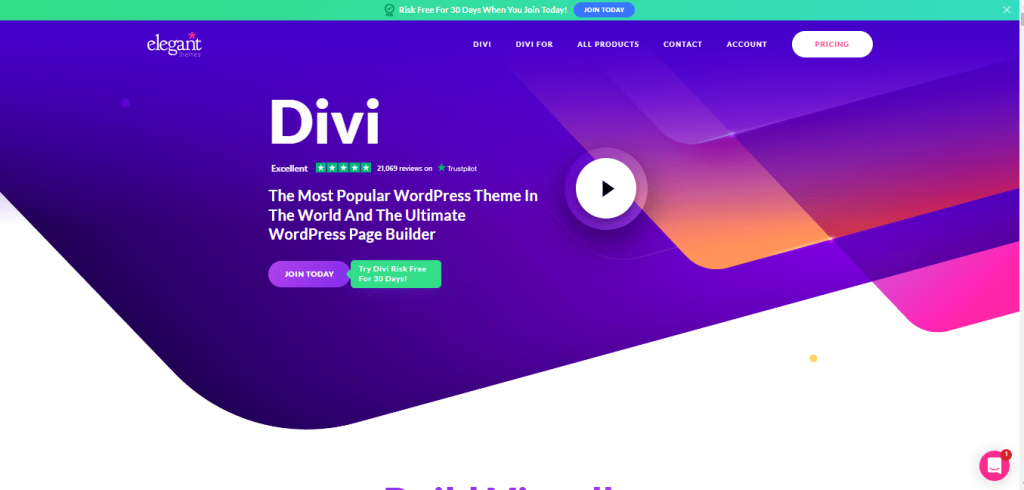
Its robust software makes it super fast to build your website with minimal effort and using its cutting-edge tools. Divi offers ready-made templates and enables you to customize your website section by section, making it perfect for newcomers, professionals, and entrepreneurs.
Users can use Divi to make unlimited sites without any restrictions or top-ups. The advanced page builder in Divi has every essential tool you need to build your dream webpage, whether for your business, personal blog, or client’sclient’s website.
Elementor Overview:
Elementor is one of the most advanced page builders and is a choice for many professionals globally. Its highly intuitive and rapid-performing software makes it an expert favorite, yet it is a simple and appealing outlook.
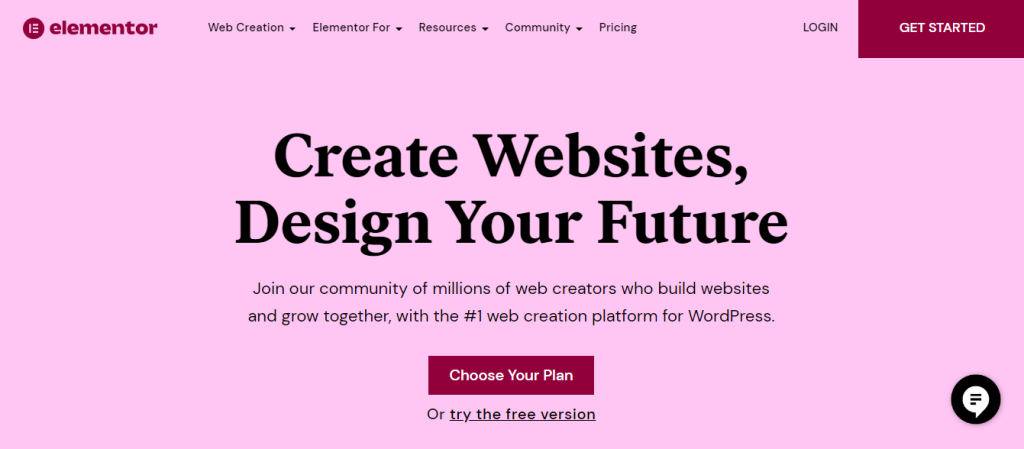
Elementor has all the basic to advanced features you need for web page building, plus its super affordable pricing makes it perfect for people on a budget. It helps you create a beautiful landing page with hundreds of efficient tools and functionalities in the most straightforward ways possible.
At its core, Elementor offers all features of a page builder however needs to be supplemented with a WordPress theme. It also has a free version where users can experience the platform with restrictions. Once the users know what they want, they can upgrade to the premium subscription plans.
Divi vs Elementor: Key Features
Now that you know better about Divi and Elementor, let us get into a detailed comparison of both web builders. Our first stop is comparing the critical feature of Divi vs. Elemetor.
| Divi Key Features | Elementor Key Features |
| More than 2000 ready-made designs | Theme Builder |
| Over 200 complete website packages | Live Editing |
| Several website-building elements | Ecommerce customizations |
| Visual Editing | Dark mode and Navigator |
| CSS control | Over 100 widgets to choose from |
| Responsive Editing | More than 300 designer templates |
Divi vs Elementor: User Interface
For a web page builder, offering a user interface that is beginner friendly yet robust enough to perform high-intensity tasks is vital. So let’s see which page builder, Divi vs. Elementor, provides a better user interface.
Divi User Interface:
Divi’s straightforward user interface makes it perfect for first-time users and people new to web page building. It also has nine user interface kits, making it super easy to build web pages for people who need to learn about creating websites.
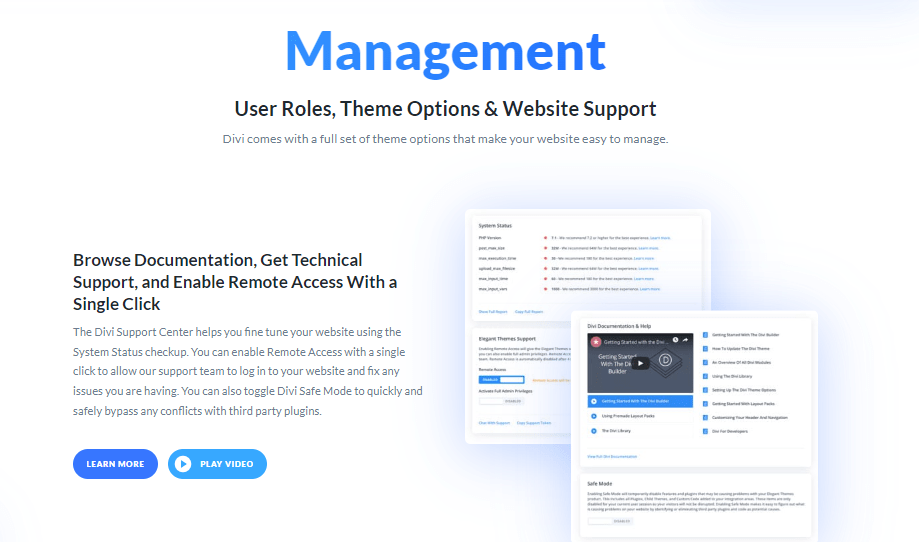
These UI kits are specially curated tool kits that contact various headers, sections, layouts, etc. Moreover, Divi has an appealing and subtle look to its website, giving users a sense of comfort. You can find everything you want in your dashboard, like elements, designs, templates, etc.
The drag-to-drop feature of Divi enables you to customize your website quickly and reshape any pre-made templates you want within a few minutes to get your website ready.
Elementor User Interface:
Elementor has shown a systematic layout, making it a well-built page builder. While Ellementor is the perfect fit for professional web page builders, new users might need more time to get familiar with the platform. However, once you figure it out, Elementor is the easiest webpage builder for creating complex layouts.
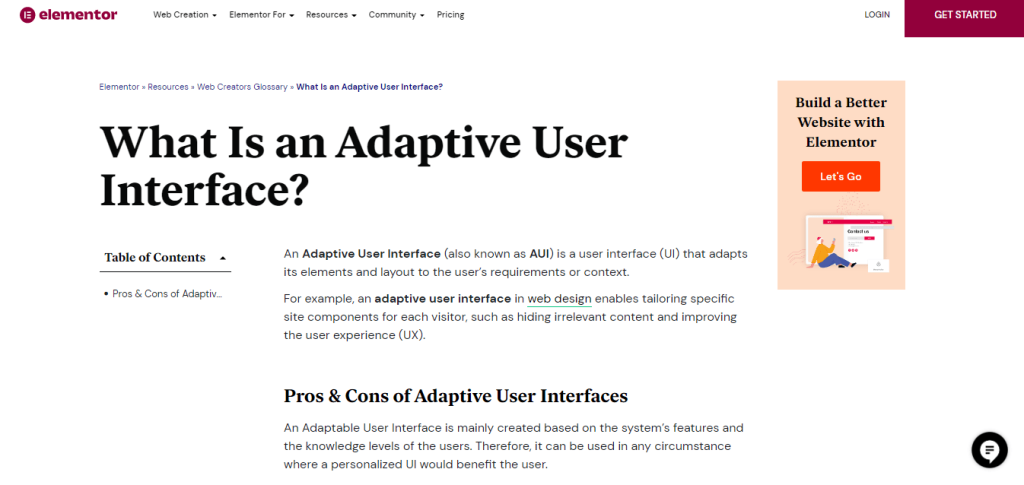
For example, if you want to add a particular widget to your website, you can search it in the side menu or look for it in different categories. All the categories, like single, basic, and pro, are further divided into subcategories where you can find unique and versatile widgets for all your needs.
While this might be no-rocket science, you might get lost in many different sections if you are a new user. In addition, Elementor keeps updating its software continuously, adding new features and tools to improve its performance, making it best suited for professional web developers and entrepreneurs constantly looking for unique customizations.
Divi vs Elementor: Integrations
Whatever website you want to establish, the quality and elements are essential in driving traffic. To ensure you can design a website according to your needs, let us see the integration Divi and Elementor offer.
Divi Integrations:
Although Divi is a WordPress theme, hundreds of integrations are available that help you create all kinds of websites. Whether you own an online store or want to sell digital products, Divi takes care of all your requirements with its diverse integrations.
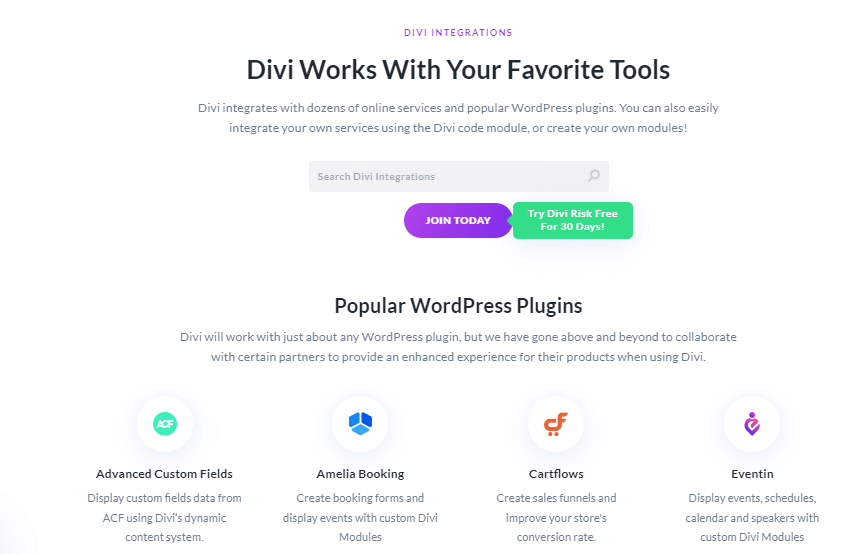
It integrates with hundreds of popular online software, sites, and thousands of WordPress plugins. When designing your website on Divi, you will find several reliable software like WooCommerce, Amelia Booking, CartFlows, WPML, and the list continues.
These collaborations offer you an enhanced experience in webpage building. Moreover, if you are a new user, these integrations will help tremendously to achieve the website design and layout you have in your mind.
Elementor Integrations:
Elementor has the best integrations any website developer could ask for. It seamlessly blends with some of your favorite marketing and CRM tools. Whether your business needs social media or email marketing, Elementor has all the right integrations available to expand your business to the next level.
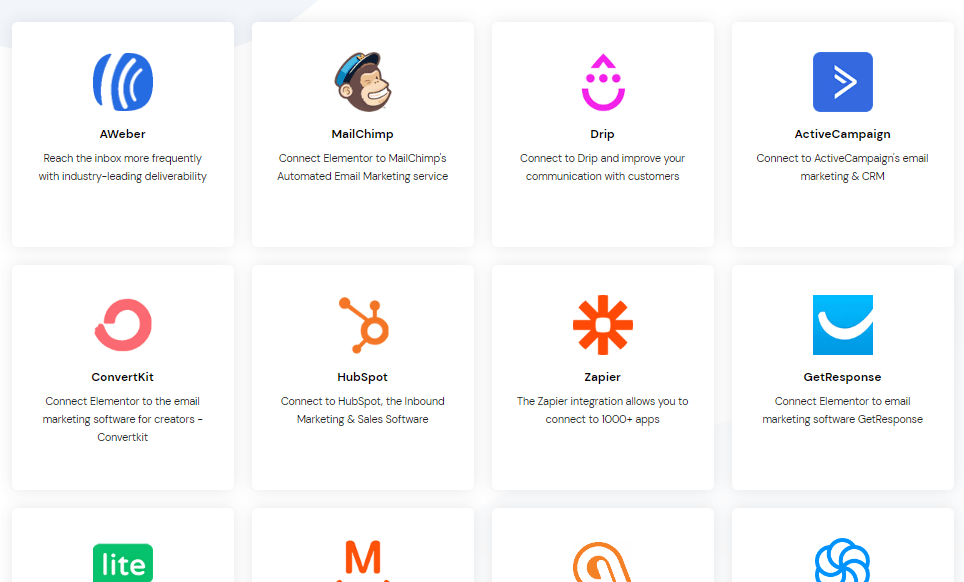
Robust marketing tools like MailChimp, Drip, HubSpot, Zapier, etc., are connected to Elementor others offer you to implement different marketing systems for your websites. For example, inbound marketing, effective communication with customers or your target audience, and many other apps and software connections.
Divi vs Elementor: Customer Support
We have seen all the exceptional features and functionalities of Divi and Elementor, but let us see how helpful and interactive their customer support is.
Divi Customer Support:
Divi has highly responsive and active customer support available 24 hours and seven weeks a year to help all new and existing users. The best part is that the support team of Divi is dedicated to providing users with a better experience every day.
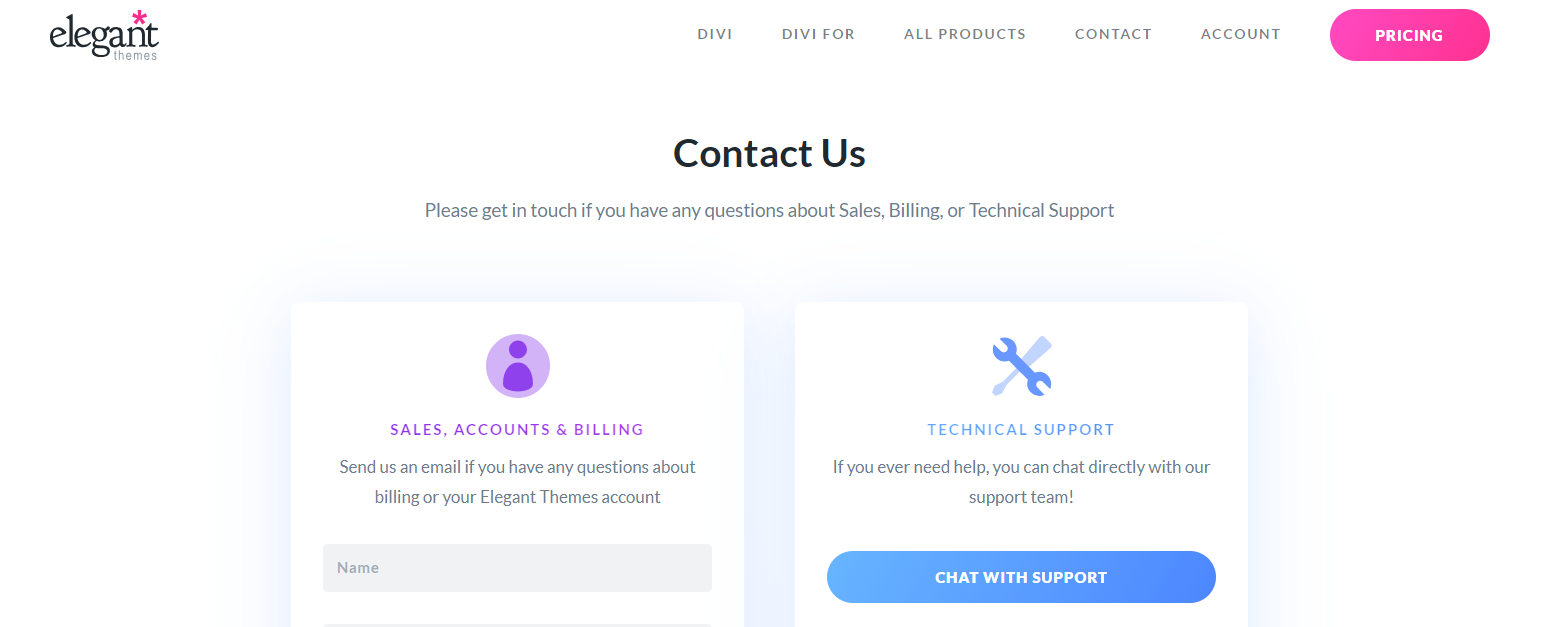
You can find various ways to contact their customer care, so if you need help, you will contact them with different options. For example, Divi has Safe Mode, System Status, and Remote access to all the users.
The Divi support centers enable you and its customer support team to fix issues more efficiently without interfering with or halting your website designs or current projects. Moreover, you can even contact them via a chat box at the bottom of their page, where an online assistant will try to solve your queries.
Elementor Customer Support:
Like Divi, Elementor has a separate customer help center active 24/7, 365 days a year. Elementor offers worldwide support and specialized experts to help immediately solve your queries and issues.
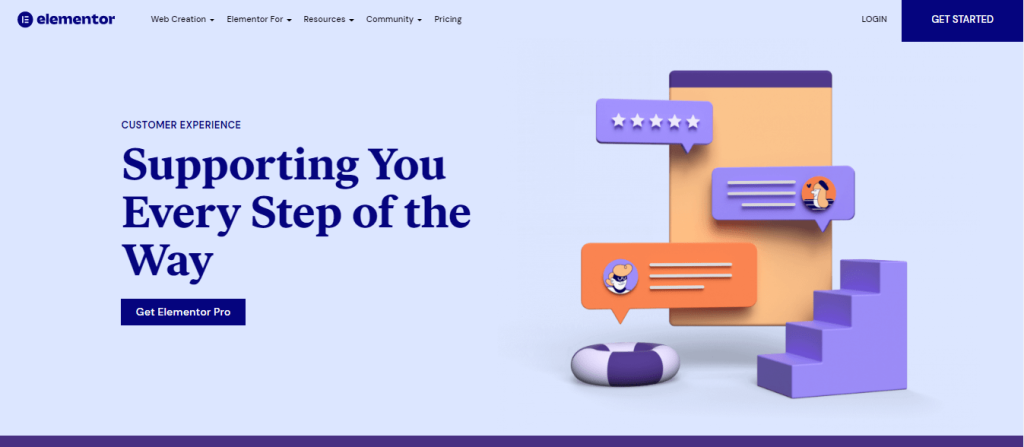
Moreover, the support team of Ellementor tries its best to understand the problems and queries faced by customers. The team is open to feedback which helps them constantly improve the platform to make web page building convenient for everyone.
The help center provides various articles, FAQs, tutorials, etc., that help you understand Elementor in a better way. However, you can always contact the team via chat or email if you are still seeking a solution.
Divi vs Elementor: Elements
While everything looks excellent about both platforms, you must be curious to know what elements Divi and Elementor offer to their users. So let us have a look at what the media have to offer and whether it is beneficial for you or not.
Divi Elements:
The Divi Builder has a simple approach to using its elements. If you have a particular element, like rows, columns, or sections, in your mind that you want to add to your website design, you must choose the ‘‘Build from Scratch’’ option.
Once you enter the design area, you can add whatever you wish to and create the website. However, Divi and Elementor offer some similar and different elements. For example, Divi offers rows, columns, and modules to add to your web page, making it ideal for content-driven web pages.
Elementor Elements:
Like Divi, Elementor categorizes its elements into three parts, sections, columns, and widgets. From the surface, it might seem that the only difference between the two page-builders is modules and devices; however, there more to it.
The rows and sessions of Elememtor have different arrangements; the sections are a compilation of columns and widgets, which are further separated by the inner section and the regular section. This formation enables you to create complex and intricate layouts making your website dense and creative.
Divi vs Elementor: Styling
Divi and Elementor proved several non-tech-savvy users wrong by offering the easiest way to design web pages without hiring expensive developers. One of the reasons is the styling options they offer, have a read to understand how.
Divi Styling:
Divi offers responsive styling that consists of different tabs in the settings panel. There are content, design, and advanced tabs curated according to the needs of all users. Once your content for the website is ready, you can head to the Design and Advanced tabs to visualize your website.
The design section has various styling options for fonts, filters, animations, box shows, etc. The layout and usage of these tabs are super simple so that people without prior coding experience can also style their custom websites.
Web developers who want to add more complex and higher customizations like CSS Ids, CSS code, CSS classes, and configure visibility can head to the advanced tabs where they will find everything they need.
Elementor Styling:
Similar to Divi, Elementor has three stylings sections with several basic and advanced options for your web page. For example, the non-coders can head to the Style tab to find all the standard amenities like typography, borders, background images, etc., to style an appealing and straightforward website.
Users who want to add more customization and increase their web page’spage’s creativity must use the Advanced option, which contains styling options like responsive settings, margins, motion effects, custom CSS code, etc.
Divi vs Elementor: Pricing
Divi and Elementor offer excellent tools and functionalities for a perfectly designed website. However, let us see the pricing of both platforms to determine which page builder fits your budget.
Divi Pricing:
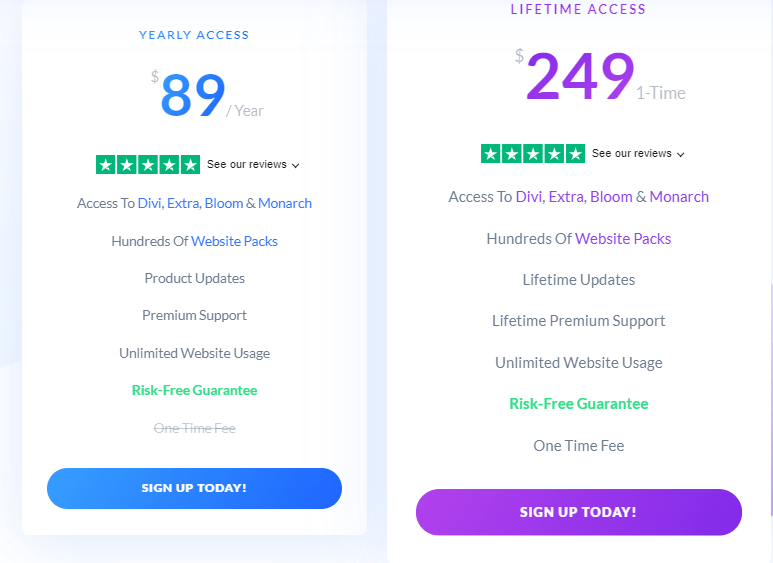
| Plans | Pricing |
| Yearly Access | $89 per year |
| Lifetime Access | $249 one-time payment |
Elementor Pricing:
Elementor also offers exclusive discount codes, which we have mentioned here.
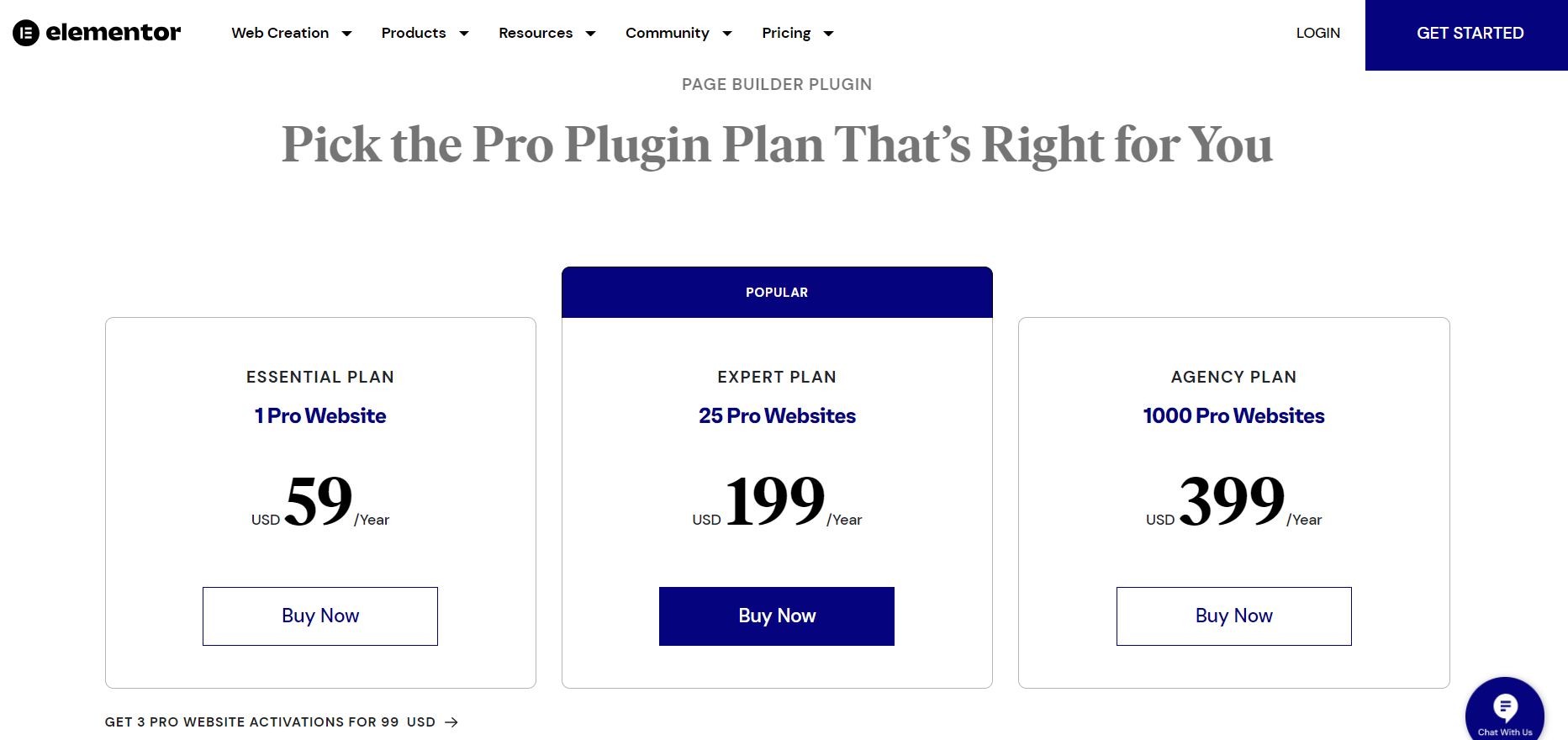
| Plans | Pricing |
| Essential | $59 per year |
| Expert | $199 per year |
| Agency | $399per year |
Elementor WordPress Hosting:
Elementor also offers a hosting plan for those who don’t have time to manage their own servers or set up a hosting solution.
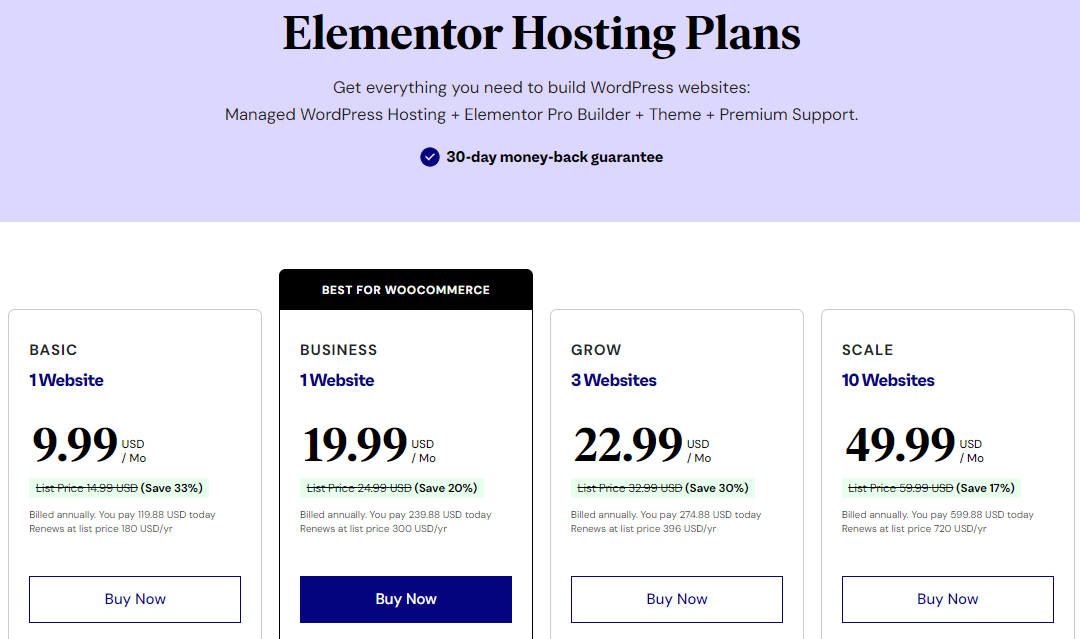
| Plans | Pricing |
| Basic | $9.99 per month (119.88 per year) |
| Business | $19.99 per month (239.88 per year) |
| Grow | $22.99 per month (274.88 per year) |
| Scale | $49.99 per month (599.88 per year) |
Divi vs Elementor: Pros And Cons
We save the best for the last, the most awaited and exciting part of the comparison between Divi and Elementor, i.e., the pros and cons list.
Divi Pros And Cons:
| Pros | Cons |
| High-quality and customizable templates | Pop-up builder is absent |
| Multipurpose theme | The software lags while creating complex layouts |
| Excellent page builder | |
| Divi provides value for the money invested |
Elementor Pros And Cons:
| Pros | Cons |
| Responsive designs | The interface is not beginner friendly |
| Global parameters available like fonts, colors, etc | The free version has a lot of restrictions |
| Accessible website content management | |
| Constant bug fixes and improvements |
Who Is Divi Ideal for?
Divi has been one of the most popular WordPress themes, making it perfect for every user. However, it is only limited to that; people with no experience in coding find Divi extremely easy to use because of its visual builder qualities.
The durable platform and hundreds of customizations help users to build and explore website designs that appear and function just like a professionally made webpage. Moreover, you can create a fast-functioning website that increases your SEO ranking.
Who Is Elementor Ideal For?
Elleemntor is the fastest webpage builder that helps you create a highly customized website. The exceptional interface enables you to add detailed customizations, designs, and elements with the snap of your fingers.
The complete tools and functionalities of Elementor never let you run out of creative designs and templates for your websites. Moreover, you can also build a website from scratch, making it the best choice for professional business owners and entrepreneurs with minimal or no coding experience.
Final Verdict: Divi vs Elementor
After comparing all the essential parameters of Divi vs Elementor, you must clearly understand what both platforms can offer to your website designs. While Divi is the perfect match for beginners who prefers visual editing styles, Elementor works best for people who want to develop advanced-level websites.
Both webpage builders have excellent ways, so declaring one better than the other would be unfair. However, if you need clarification, go through your checklist and compare the budget you are ready to invest in a page builder, and you will choose within no time.
This article was helpful for you to determine which page builder is better, Divi vs. Elementor. Over to you; which webpage builder did you choose? Let us know in the comments section below!
FAQs: Divi vs Elementor
Yes, Elementor offers all new and existing users a free pan without any time limitations. However, there are restrictions on the tools in the free version, which you can unlock in the premium subscription.
Divi does offer its user a no-question refund policy within the first 30 days of their subscription. In this policy, all users unsatisfied with Divi’sDivi’s service can seek their money back within the first month of their membership.
Divi has many templates, designs, and styling options that enable you to create websites for different niches, including e-commerce and online business websites. Moreover, it has powerful integration like WooCommer to make page building easier.
Yes, you can use Elementor with Divi. Elementor is a WordPress page builder plugin that provides an easy and powerful way to design beautiful websites. Its drag-and-drop interface allows users to create custom page layouts by simply dragging and dropping elements into place.
When comparing Elementor and Divi, there is no clear winner. Both have their pros and cons. When it comes to speed, Elementor is generally faster than Divi. Elementor has a much simpler interface with fewer elements needing loading. It also uses caching and compression technologies to reduce page loading time.
On the other hand, Divi may also be more difficult to navigate and use. It can be overwhelming for users who are not experienced with web design and development. As a result, the learning curve is steep, and beginners may need help to figure out how to get started.
When it comes to choosing between Divi and Elementor for a beginner, it depends on the goals of the user. Both platforms provide powerful website-building tools and great options for creating dynamic websites.

This is Wagner, an experienced Amazon FBA expert, and eCommerce enthusiast. With years of experience selling on Amazon, I got a wealth of knowledge to share with fellow sellers. In their writing, I cover a range of topics including Amazon FBA strategies, eCommerce trends, and online retail best practices.
